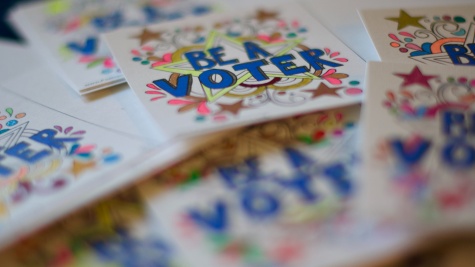Election Worker Recruitment and Retention in North Carolina
The MIT Election Data and Science Lab helps highlight new research and interesting ideas in election science, including through research grants under our ongoing Learning from Elections program.
Our post today was written by Jason Roberts and Michael Greenberger, based on their ongoing research funded by this program. The information and opinions expressed in this column represent their own research, and do not necessarily represent the opinions of the MIT Election Lab or MIT.
Our focus in this project is on the institutional capacity to administer elections in North Carolina, which are administered primarily at the county level.
Each county has an appointed Board of Elections that hires and supervises an Elections Director. In many counties, the Elections Director hires and supervises staff members who assist the Director in administering elections. In addition, the Elections Director and their staff assist the county Board of Elections and the county’s party officials in appointing and training election judges and other poll workers. The overwhelming majority of the work of administering elections in North Carolina is conducted by three groups of officials: (1) Elections Directors, (2) staff who work under the Elections Director, and (3) election judges and poll workers. Our analyses focus on these three groups of officials.
In consultation with Karen Brinson Bell, the executive director of the State Board of Elections in North Carolina, we have identified three threats that may limit the ability of North Carolina counties to have sufficient institutional capacity to administer elections in the wake of the 2020 election: (1) COVID-19, (2) macroeconomic conditions (primarily inflation and tight labor markets), and (3) security threats to elections officials. We are in the process of conducting a survey of all current Election Directors, election staff, poll workers, and election judges with questions related to how concerns about COVID, increased levels of threats and harassment, and changing economic conditions have affected their choices to remain in or leave elections work. Using the results of our survey, we plan to work with Director Bell to recommend non-partisan policies to increase election worker retention.
Progress to Date
Working with Director Bell, we completed our survey instrument in November of 2022. We were able to identify the names an email addresses for Election Directors in 97 North Carolina counties (3 directorships were vacant) and we fielded our survey to Directors on December 13, 2022. No central list of names and emails for elections staff or poll workers exists, so these data are being gathered on our instrument sent to Election Directors. As of February 14, 2023 we have received completed responses from 93 Election Directors.
The survey for full time staff working under Elections Directors went into the field on February 1, 2023. Of the 93 Elections Directors responding, 18 indicated they had no full time staff in their office, and 57 indicated they had less than three. Most election staff work in just a handful of the largest counties. As of February 14, 2023 we have received completed responses from 66 full time staff working under Election Directors in 36 counties.
Results to Date
Our preliminary results present a mix of good and bad news with respect to how Elections Directors and staff view their jobs. The good news is that most Elections Directors and staff are satisfied with their jobs — see Figure 1. The bad news is that 85% of Elections Directors report that work related stress has grown since 2019 and 83% report that threats against elections officials have increased since 2019. A little more than 25% of Elections Directors report having personally been threatened and almost half report that they know of staff or poll workers have refused to continue working in elections because of threats they have received. More than one-third of Directors report that it was more difficult to recruit poll workers in 2022 than in 2020. One of the biggest issues Directors report with respect to their own continued employment and the hiring and retention of staff and poll workers is low pay. More than 50% cite low pay as a reason staff are leaving and why they are considering leaving, while 60% cite low pay as a reason why it is increasingly difficult to recruit poll workers.
The results for staff working under Elections Directors are similar, though the preliminary results suggests room for cautious optimism. Only 52% of staff report that work related stress has grown since 2019, and only 55% report that threats against election officials have increased since 2019. Still, over half of all staff reported being at least somewhat concerned about threats of physical violence being made against them personally. About 50% of staff report that recruiting other staffers is made more difficult by threats against elections officials, and around three-quarters of staff report that threats make recruiting election day workers difficult.
Pay is also a major concern for the retention of elections staff. About three-quarters of staff believe they could find a higher paying job if they sought work in the private sector, and 56% believe they earn less than other government employees with similar skills. A preliminary summary of our results would suggest that the combination of COVID-19 and the changing political environment is making the job of working in elections more stressful and more difficult and the compensation has not kept pace with the changing working conditions—just 52% of election staff reported that they would be at all interested in working as an Elections Director in the future.
Next Steps
Later this month, we will launch our survey of 2022 poll workers.


